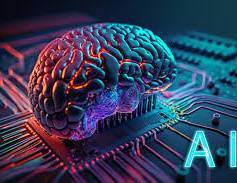"The Future of Artificial Intelligence: Opportunities, Challenges, and Ethical Implications":
**The Future of Artificial Intelligence: Opportunities, Challenges, and Ethical Implications**
Artificial Intelligence (AI) has rapidly evolved from a niche technology to an influential force driving innovation and change across multiple sectors. From healthcare to finance, transportation to entertainment, AI’s capabilities are reshaping industries, driving efficiencies, and expanding the boundaries of what is possible. Yet, alongside these advancements, AI also brings complex challenges and ethical considerations. As society progresses toward a more AI-integrated future, it’s essential to understand the potential opportunities and challenges that this transformative technology presents.
### 1. **Unleashing AI’s Potential Across Sectors**
AI’s versatility is evident in its applications across numerous domains:
- **Healthcare**: AI has the power to revolutionize healthcare, particularly in diagnostics, personalized medicine, and drug discovery. AI algorithms can analyze medical images faster than traditional methods, aiding in the early detection of diseases such as cancer. Additionally, machine learning models are enabling the development of tailored treatment plans based on an individual’s genetic profile, lifestyle, and medical history, making healthcare more personalized and precise.
- **Finance**: In finance, AI is used for fraud detection, algorithmic trading, and risk assessment. By analyzing vast amounts of data in real time, AI-driven systems can detect anomalies indicative of fraudulent activity, protecting both businesses and customers. Additionally, AI-powered robo-advisors are democratizing investment, making financial services more accessible to the general public.
- **Transportation**: Autonomous vehicles are among the most publicized applications of AI in the transportation industry. With advancements in machine learning and computer vision, self-driving cars are moving closer to becoming mainstream, promising increased road safety and reduced congestion. Beyond autonomous vehicles, AI is optimizing logistics, enhancing efficiency across supply chains, and reducing carbon emissions.
### 2. **Challenges Posed by AI**
While AI presents many opportunities, it also introduces significant challenges:
- **Job Displacement**: One of the most immediate concerns surrounding AI is its potential to disrupt job markets. Automation could replace roles traditionally performed by humans, particularly in sectors such as manufacturing, retail, and customer service. While AI will create new jobs, the transition may result in a skills gap, requiring significant investment in retraining and education.
- **Data Privacy and Security**: AI systems rely on vast amounts of data, raising concerns about privacy and data security. In cases where sensitive information is involved, the potential for misuse or unauthorized access can be a serious risk. As AI grows, so does the need for robust data protection frameworks to ensure user data remains secure and private.
- **Bias and Fairness**: AI systems are only as unbiased as the data used to train them. If a dataset contains historical biases, the AI model will likely reproduce these biases, leading to unfair outcomes. Addressing bias in AI requires a conscientious approach to data collection, model training, and regular auditing to ensure fair and equitable results.
### 3. **Ethical Implications of AI**
The ethical implications of AI span privacy, accountability, and transparency:
- **Autonomous Decision-Making**: As AI takes on more decision-making roles, questions arise around accountability. Who is responsible if an autonomous system makes a harmful decision? This is especially pressing in areas like autonomous weapons, where AI systems could potentially make life-and-death decisions.
- **Surveillance and Civil Liberties**: AI-powered surveillance technologies, such as facial recognition, pose significant concerns for privacy and civil liberties. While these technologies can enhance security, they also have the potential to enable unwarranted surveillance, raising ethical questions about consent and freedom.
- **Transparency**: Many AI algorithms, especially those involving deep learning, operate as “black boxes,†making it challenging to understand how they arrive at decisions. For AI to be ethically sound, it’s crucial to improve algorithmic transparency, allowing users to understand the rationale behind automated decisions.
### 4. **A Roadmap for Responsible AI Development**
To harness the benefits of AI while addressing its challenges, society must prioritize responsible AI development. This involves:
- **Ethical AI Frameworks**: Governments, corporations, and institutions should work together to establish frameworks that guide the ethical use of AI. These frameworks should address key issues such as data privacy, bias prevention, and accountability.
- **Collaboration and Knowledge Sharing**: Cross-disciplinary collaboration will be critical in advancing AI responsibly. Bringing together technologists, ethicists, policymakers, and industry leaders can foster more comprehensive approaches to AI governance and regulation.
- **Investment in Education and Skills Training**: Preparing the workforce for an AI-driven future requires a commitment to education and reskilling. Investments in STEM education, digital literacy, and lifelong learning programs will be essential in equipping individuals with the skills needed to adapt to AI’s growing presence in the workplace.
### 5. **Looking Ahead: AI as a Force for Good**
AI’s potential to address some of society’s biggest challenges is immense. From tackling climate change through predictive analytics to improving healthcare accessibility in underserved areas, AI can be a force for good if developed and implemented responsibly. The decisions made today regarding AI’s ethical and regulatory frameworks will have far-reaching implications, shaping the kind of society we live in for generations to come.
### **Conclusion**
The future of AI is both promising and complex. As this technology continues to advance, it will open new frontiers, but also challenge existing societal norms and ethical standards. By fostering a responsible and collaborative approach to AI development, we can harness its transformative power to create a future that benefits all of humanity, ensuring that AI remains a tool for positive change and progress.



No comments yet
Be the first to share your thoughts!